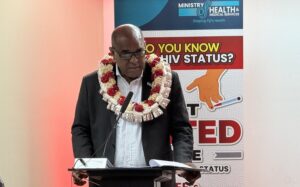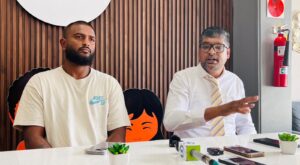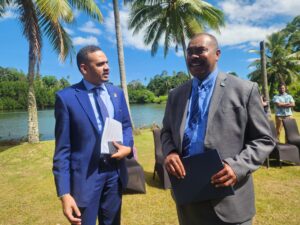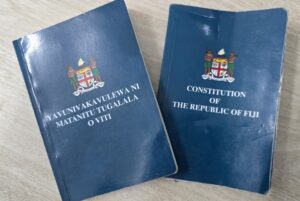Republished from Fiji Plus Magazine
Originally published in November 2019
Headhunted and hand-picked by Ratu Sir Kamisese Mara to take over the reins of Ratu Kadavulevu School (RKS) in 1984, Amraiya Naidu couldn’t afford to fail Fiji’s first Prime Minister and his ultimate boss; the ailing college that was formerly a bastion of iTaukei scholastic pride; and himself.
At stake for him was the towering reputation he had built as Labasa College’s long-serving, “tenacious and uncompromising principal” who was revered Fiji-wide for cultivating the highest standards of academic achievement.
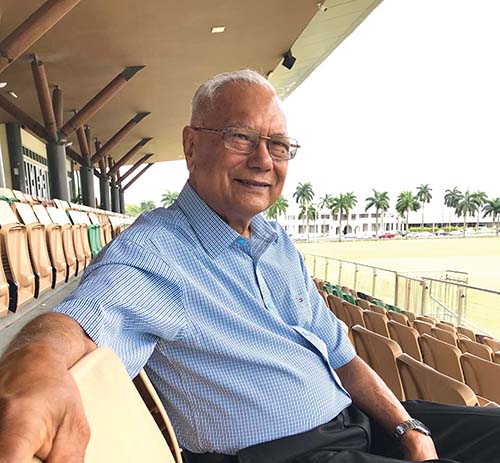
Naidu was the answer to Mara’s prayers for RKS. The government boarding school established for iTaukei boys had (according to a 1983 report given to Mara) seemingly lost its way in fulfilling its founding purpose.
Mara’s choice of Naidu was considered “revolutionary” – both in the prevailing context of Fiji’s racial realpolitik and for the task that needed to be undertaken.
Not unexpectedly, Naidu’s appointment stirred some controversy in the community – particularly amongst the establishment – who had to experience the ‘culture shock’ wrought by the troubleshooter’s reforms.
“He shook RKS down to its very core,” recalls veteran journalist, Samisoni Pareti who was a senior boy at the school during that time.
“Everything was scrutinized and changed, if deemed unnecessary – ranging from the structure; the values; and culture of the school; to leadership; and academic results.”
Within his first year, Naidu drove the school to a 100% pass rate – a stunning turnaround, given RKS’ appalling previous record.
The spectacular success of Naidu’s revolutionary enterprise – demonstrated by the release of examination results in January 1985 – was headlined by Fiji Times: “RKS has 100pc pass in Fiji Junior Exam”; the lead paragraph remarking that RKS was the only school in the country to achieve that feat in 1984.
Naidu’s brand of rigid discipline and single-minded focus worked their magic in resurrecting RKS’ former glory. Over the next three years, Naidu worked together with teachers and students to improve the quality of RKS’ pass rate – with students not just passing, but the majority attaining an ‘A’ grade pass with high qualifying marks.
Elevated by those results to rank alongside the nation’s premier schools, RKS continued to reign supreme on the sports field – winning the prestigious Deans rugby trophy for 3 of the 4 years that Naidu was there (1984, 1985, 1987) as well as the boys division of the Fiji secondary schools athletics competition from 1984 to 1987.

It was a crowning achievement that few, if any, have eclipsed – and established Naidu’s credentials as a future architect of Fiji’s education system.
“We won Deans, we won the athletics, and we won in the classroom,” Naidu remembers.
It was inevitable that Naidu would become the Ministry of Education’s permanent secretary and follow the footsteps of his predecessors there to join the foreign office.
His stint as principal of Labasa College from 1976 to 1984, however, is the reason why Naidu belongs to a tribe of Fiji’s peerless educators.
During his tenure there, Labasa College’s pass rates were phenomenal – students would consistently obtain the highest marks in Fiji’s exams; repeatedly win the national quiz championships; typically secure the most scholarships; and dominate the University of the South Pacific’s annual intakes for foundation studies. Senior staff of the Fiji School of Medicine were rumoured to travel to Labasa each year and select nearly half of their students from Labasa College.
Labasa College became the pride of the North, and the envy of the country.
Nothing could have made Naidu, a native of Labasa, more proud. He was born less than 10km away from Labasa College – and among the first batch of students when it opened in 1957 as Labasa Secondary School.
A sugarcane farm in Tabicola outside Labasa was where Naidu was raised with his brother and 5 sisters.
“We were quite poor,” he reveals. “We were totally reliant on sugarcane and all our groceries were bought on credit from shopkeepers, while we awaited payment from the cane harvest. So we were in debt perpetually.”
“We had a small holding allocated to us by the CSR and right from the beginning we all contributed to farm work. There was no free lunch.”
Naidu and his siblings would walk 7km to the primary school in Tuatua and back every day, barefoot in the burning Babasiga sun.
His brother, who was the eldest, left school early to help his ageing father. A week before his death, their father (who was among the last wave of Fiji’s indentured labourers) extracted a promise from his elder brother to ensure Naidu completed his education.
Naidu remembers his father saying: “the two of you won’t survive on the earnings from our small farm, so please if you can do something, do your best to get him educated so he can earn a living doing something else.”
“My brother lived up to that. He supported my education. He was like my father. Whatever I have accomplished, I owe it to my brother. I’m forever indebted to him.”
Naidu passed his Senior Cambridge and was admitted to Nasinu Teachers College before securing a scholarship to study in India for 3 years. He returned to commence teaching science at Labasa College. It wasn’t long before he was posted to Natabua High School, and then be despatched back to Labasa College as Assistant Principal.
His first posting as principal was at Nadi Sangam College in 1974, and he was already making strident progress with the pass rate there when Labasa College recalled him again to lead his beloved alma mater.
Naidu’s 8-year tenure as principal is widely regarded as Labasa College’s “golden age”.
A natural leader, he inspired both his staff and students. “It was just the motivation,” he reckons, when asked what he did right. “Discipline was instilled from the day students were selected to Labasa College – they were only welcome to join us if they came with a purpose.”
“My staff were always energized and working together as a team.”
Pareti recalls the same zeal and dedication pervading RKS with Naidu’s arrival there in 1984. “He made the teachers give students homework to take home during the first and second term school holidays, and cancelled their farm duties in the third term to allow them more time for private study.”
His addresses during school assemblies were described as “fiery, inspirational and infused with optimism” – and when the students were sent to do farm work, the principal who grew up in a farm was right there beside them.
Academic excellence was attained in a very short time, Pareti says, by the way Naidu changed the culture of learning and how he motivated students and teachers, alike, to surpass their expectations.
After finishing his stint at RKS in 1987, Naidu was transferred to the Ministry’s headquarters at Marela House. There he rose to the rank of permanent secretary – serving under the reigning SVT Government’s Education Minister, Taufa Vakatale.
Naidu was well over 55 years in 1999 when Vakatale approached erstwhile Prime Minister Sitiveni Rabuka to exempt him from compulsory retirement. Rabuka declined her request – telling Vakatale he preferred to despatch Naidu to New York as Fiji’s Permanent Representative to the United Nations.
Vakatale returned to Marela House to break the news: “Amraiya, I have lost; you have won.”

He was stationed at the UN when the 2000 coup happened. As the country struggled to return to democracy, Naidu was tasked to secure diplomatic support for a UN resolution to oversee the country’s next elections.
Naidu was recalled from the UN when Laisenia Qarase became Prime Minister, after the 2001 elections. Qarase stationed him within his office to serve as a roving Ambassador. He continued in that role for 3 years before being posted to Canberra as Fiji’s High Commissioner to Australia. He retired from Fiji’s diplomatic service in June 2007.
Naidu’s long and distinguished career in Fiji’s teaching and diplomatic services have earned him the nation’s debt and praise for his uncompromising loyalty to principle.
In 2017, Fiji’s President awarded him the Companion of the Order of Fiji medal. Naidu accredits that pinnacle of honour to the “unstinting support and countless sacrifices” of his life companion, Aruna and their two sons, Sanjeev and Sanjesh.
This living legend of Fiji remains in high demand long after he retired. Naidu belongs to a rare breed of Fijians possessing the character, discipline and mindset to find time – voluntarily in his case – to contribute to the welfare of our citizenry.
Since 2012, after taking time off to travel and relax, he was enlisted by the Then India Sanmarga Ikya (TISI) Sangam to chair Sangam College of Nursing’s Academic Board.
The Labasa-based, college is qualifying nurses to meet employment opportunities in Fiji’s healthcare sector. Its official recognition by the Fiji Higher Education Commission and the Fiji Nursing Council is yet another feather in Naidu’s cap as a teacher.
Teaching has not just been his bread and butter, but his heart and soul. “We cannot fail,” he insists: “The teachers build the nation.”
Read more stories like this on Fiji Plus Magazine.



